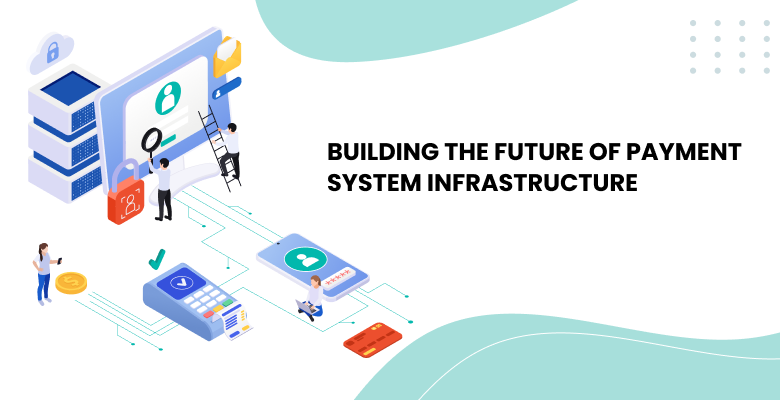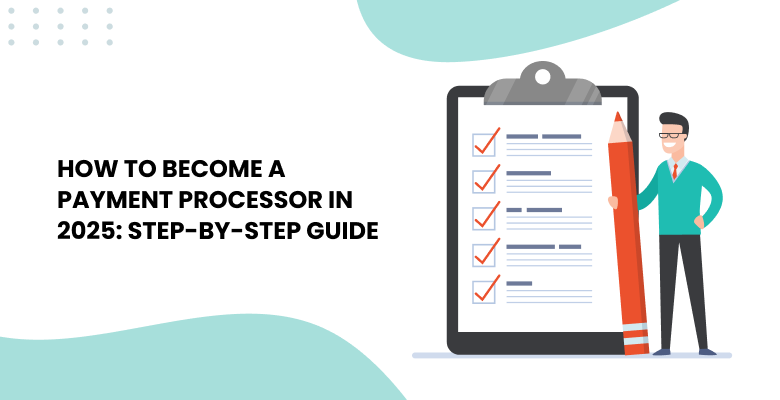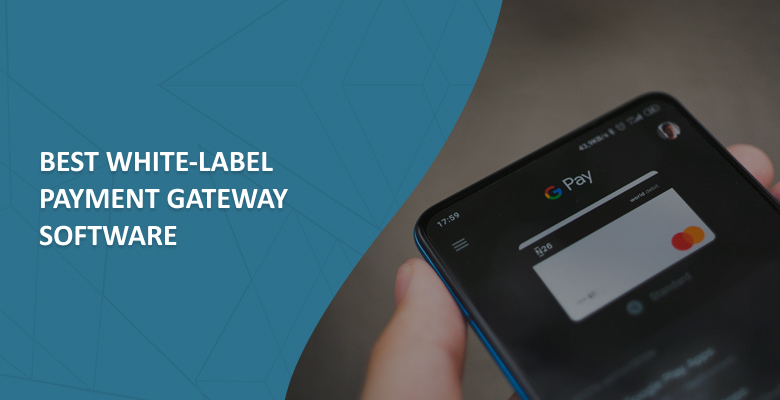
Creating a cutting-edge payment gateway that ensures both smooth and fast checkout process is mandatory for any business willing to expand its market presence. However, with the cost of development and maintenance, such a gateway can become a real financial burden. That is why more and more businesses seize the opportunity of utilizing the “white-label” payment gateway to instantly get access to all the great features the system has to offer with no initial cost for development required. In this article, we’ll look into the benefits and pricing, and explore your best white-label payment gateway software options available now.
What’s white-label payment gateway software?
In a nutshell, white-label payment gateway software is a payment system developed by expert third-party providers. Merchants or agents usually use or resell this system as their own by completely changing the system’s branding to match corporate style guidelines (hence the “white label” notion).
Maintenance, hosting, adding new integrations to the list are all the responsibilities of the technology provider. In the meantime, the merchant gets to enjoy all its benefits without worrying about the tech aspects of the gateway. This model has become increasingly common among the popular white-label payment gateways used by both startups and established companies.
Best white-label payment gateways in 2025
With online purchases being an integral part of our daily lives, the demand for white-label payment solutions has grown exponentially. As a response, new technology vendors emerged turning the market into a highly competitive one. We’ve looked into the market leaders and are now ready to present the best white-label payment gateways you can choose from.
1. Akurateco
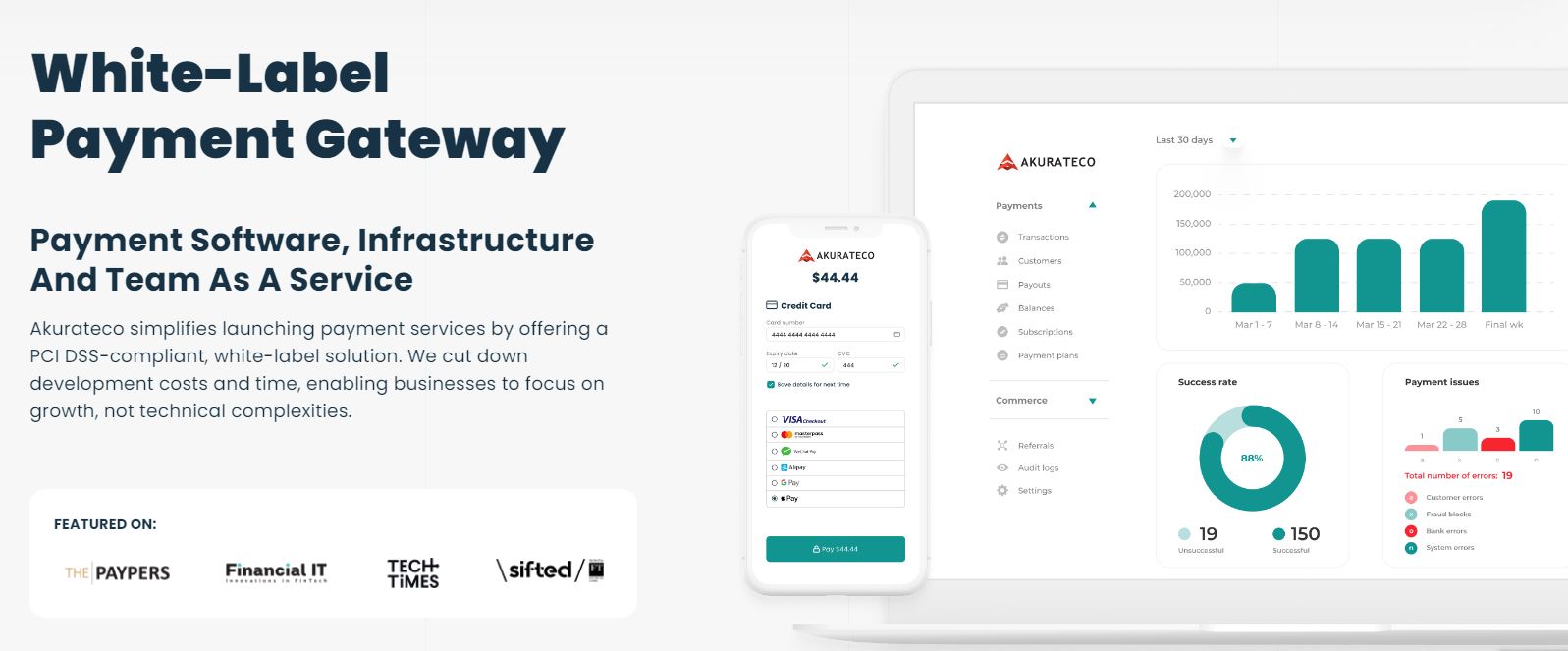
As global payment technology provider, Akurateco was developed by experts with 15+ years of hands-on experience in FinTech. They’ve combined all their expertise in the payment industry to create two brand-new products: a Cashier and a White-Label Payment Gateway.
Powered by a team of professionals, the system uses the industry’s best practices to enhance their customers’ payment game as well as brings new groundbreaking features not yet present in the market.The system offers:
– 350+integrated banks and payment methods worldwide;
– Smart routing and cascading to grow transaction acceptance ratio and cut the processing fees in half;
– Cutting-edge smart invoicing to allow merchants to automatically charge users for pre-defined payment actions;
– Payment calendar that ensures merchant’s full control over cash in/out flows;
– Affordable rates;
– Integrations and features development on request;
– A fully brandable and easily customizable system fine-tuned to the needs of your particular business;
– Enhanced security measures and advanced analytics and reporting.
Obviously, there are plenty of advantages to Akurateco’s white-label payment platform. However, while the company is relatively new and offers a high degree of flexibility for its clients compared to the more mature competitors, which tend to stick with their ways, the system simply cannot be compared to independently developed software in terms of customization.
That said, Akurateco’s flexibility and extensive integrations make it a strong contender when considering the best white-label payment gateway for businesses looking for scalability, branding freedom, and rapid deployment.
2. Nuvei
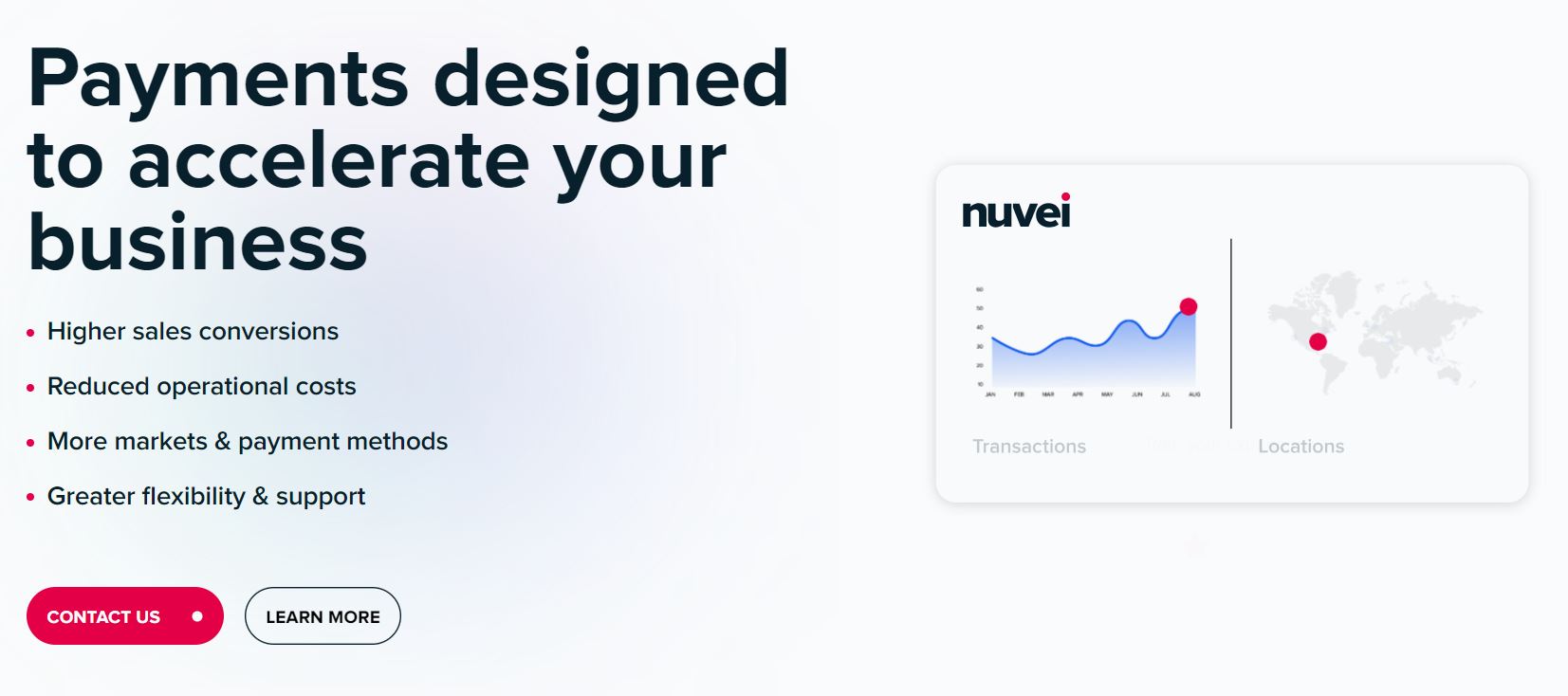
Nuvei, a real giant of the payment industry, is another great solution on our list. It offers a payment gateway with access to an extensive network of connectors. The company aims to help businesses accept cutting-edge payment options, optimize new revenue streams, and get the most out of their existing stack.Among the benefits of the system are:
– 450+ payment methods for improved cross-border business growth;
– Multiple system integration options to facilitate different checkout scenarios;
– Full control over the transaction flow;
– Detailed analytics and cutting-edge reporting engines;
– Compatibility with PCI DSS Security Standards;
– Dedicated customer support and simplified onboarding process.
The system can be a real gem for merchants willing to fully automate their payment flow. Besides, they state that the integration of their white-label payment processing platform will help the merchants grow their turnover and skyrocket customer loyalty. However, remember that size matters. And big companies typically aren’t as flexible. And they are more tuned to the needs of bigger businesses rather than smaller enterprises.
As one of the top white label payment gateway providers, Nuvei caters especially well to enterprises with complex transaction needs and high-volume operations.
3. Ikajo International.
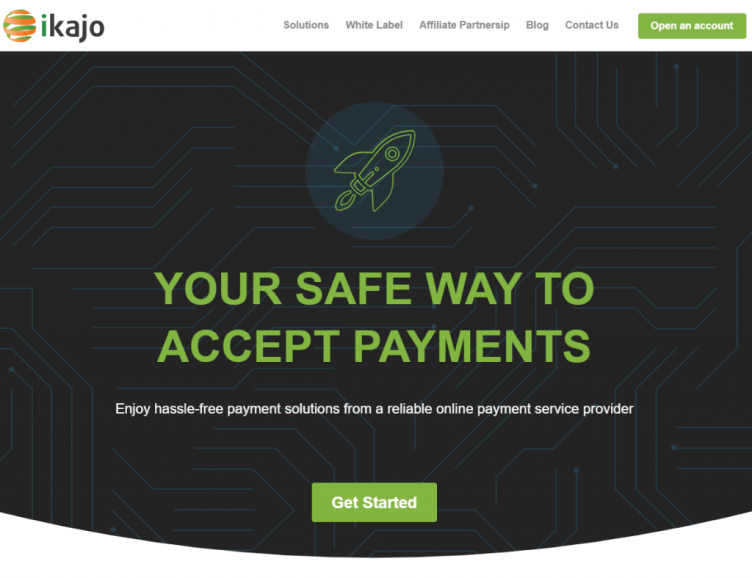
A pioneer in the payment industry, Ikajo International also offers white-label merchant services. The company offers more than 100 payment methods available, powerful security and risk management solutions, and an extensive acquiring network.
Besides, it also offers:
– Free recurring billing;
– 170+ countries supported;
– Smart routing and cascading features to grow one’s transaction approval ratio;
– Advanced analytics;
– Various system integration options;
– High-end dispute management;
– Real-time monitoring for increased control over the payment flow.
The company offers comparatively affordable rates. But remember that their services and the system are more fine-tuned to high-risk merchants leaving some of the needs of the low-risk ones unmet.
These are the best payment gateway software providers you should consider when choosing one for your business. In the meantime, let’s look into the advantages of having white-label software. Ikajo’s inclusion in this white-label payment gateways list is justified by its tailored approach to high-risk industries, offering one of the more popular white-label payment gateways among specialized verticals.
Advantages of white-label software
- No development cost.
The development of a payment gateway can cost your business a real fortune. Hiring a team of payment and technology experts to work on the system can become a financial burden your business simply cannot handle at this stage. If that’s so, opting for a white-label solution can be the way to go. - Fast go-to-market.
Given that an average integration with a white-label system takes from a couple of weeks up to one month, it speeds things up for merchants and payment service providers all set and ready to start their operations. Starting sooner rather than later is essential to the success of your business. - No maintenance costs.
Entrepreneurs that opted for a white-label payment gateway solution don’t have to worry about maintenance costs because it’s off their responsibilities list. Updating, upgrading, and innovating are all on the technology vendor. - Increased brand reputation.
Providing a smooth transaction flow and a variety of checkout options to meet the needs of customers from different locations and with different shopping habits can help you boost your business reputation. And it’s hard to put a price on that! - Customer loyalty.
While new customers are more likely to trust their transaction processing to a company with a strong brand reputation and image, the existing clients are more likely to stay with their existing ones as long as the vendor offers an uninterrupted checkout experience and solid security measures. And you can easily get that with a reliable white-label provider. - Instant access to hundreds of payment integrations.
How would you like to get instant access to hundreds of connectors to banks and payment methods with a single integration? You’ve got it! Simply choose a white-label payment provider with an extensive integrations list – and in an instant, you have access to a variety of connectors.
These are but a few of white-label payment benefits every business should consider when choosing between an in-house development and a white-label payment gateway, especially given the modern and legacy payment software differences in terms of adaptability and cost.
“When we chose a white-label solution, we not only cut costs but also launched our service in just three weeks. The platform was easy to tailor to our needs, and having access to ready-made integrations significantly accelerated our scaling.”
Would you like to see other ways your business can benefit from a white-label payment gateway? If you’re comparing options and asking what is the best white-label payment gateway, understanding the cost structures will help narrow down which platform fits both your technical and financial expectations.
White-label payment gateway cost
The most common question business owners have is about the cost of a white-label payment gateway. While the question is perfectly fair, the answer is not always straightforward, as pricing depends on several variables, including feature set, level of customization, integrations, compliance requirements, and support.
- To get an understanding of its value, let’s place it alongside the cost of building a payment gateway from the ground up:
- Creating a bespoke payment gateway costs anywhere from $250,000 to over $1 million, depending on complexity, certifications required (e.g., PCI DSS), infrastructure, and development time (usually 12–18 months).
- On the other hand, a white-label payment gateway can cost anywhere from $10,000 to $15,000 for a simple branded solution, with more advanced and tailored implementations costing as much as $50,000 or more. It also carries ongoing licensing or per-transaction fees, but it dramatically reduces time to market.
Why it’s affordable?
White-label solutions eliminate the need for flashy up-front investments in infrastructure, compliance, and product development — but leave the doors open to a proven, tested, and scalable platform. This enables companies to go live in weeks instead of years and begin generating revenue earlier.
White-label payment gateway pricing structure
Although the cost of a white-label payment gateway differs from one provider to another (more on that below), most providers follow the same pricing structure. It includes:
- Setup fee: a one-time fee covering the initial payment gateway configuration to tailor the system to the client’s needs.
- Recurring fees. As white-label payment gateways are typically distributed on a subscription basis, companies pay an ongoing monthly or annual fee for their services.
- Transaction fees: a fee charged per transaction processed through a gateway.
- Additional fees: charges per any additional services, such as feature or integration development, PCI DSS compliance assistance, 24/7 customer support, etc.
Another important thing to mention is that white-label payment gateway costs can vary significantly from one client to another. And here’s why:
- Transaction volume. Most payment gateway providers offer tiered pricing based on the customer’s transaction volume. Clients with higher transaction volumes will likely benefit from better pricing, while those with fewer transactions may incur higher transaction fees.
- Customization needs.Offering a standardized payment solution, white label payment gateway providers adjust costs to a degree of customization the customer requires. Businesses needing extensive customization in terms of branding and feature adjustment are likely to pay more than those with fewer requirements.
- Regions of operation. Since some regions like the Kingdom of Saudi Arabia, require additional compliance with local regulations such as hosting payment infrastructure inside the country, compliance with them may incur extra costs.
- Additional fees: charges per any extra services specified by the client.
Provider-specific costs
As you already know, the costs also differ from one payment provider to another. There are several reasons for this:
- Market position. The most well-known providers on the market may charge premium prices, while newly established players might offer more competitive rates.
- Technology and infrastructure. Software providers offering the latest payment infrastructure and technology may charge more due to the higher development and maintenance costs, as well as greater demand.
- Customization and flexibility. There are various vendors on the market: some try to meet every client’s unique needs, while others don’t. Typically, the price will depend on the level of system customization.
- Additional factors. Some additional factors that may influence the price include the number of integrations, the quality of support, geographical coverage, etc.
Overall, there’s a vast array of factors that influence the cost of a white-label payment gateway. Generally, the more bells and whistles, the higher the price tag. Yet, that’s not always the case. Since many payment providers keep their pricing cards close to the chest not being able to calculate the costs for each individual client beforehand, the best move is to reach out to their team. No strings attached. This way, you’ll not only find out about pricing but also gain insight into whether their services align with your business needs and values. If you’re looking to have more control over your payment processing, you may also want to explore how to create your own payment gateway. Building a customized solution tailored to your specific needs could be a cost-effective alternative in the long run. However, payment gateway extension integration challenges like system compatibility, legacy migration, and partner onboarding timelines should be considered when evaluating TCO.
Conclusion
Whether you are a merchant or a payment service provider shopping around various white-label payment solutions, you need to know your options. The market keeps on growing thanks to the growing popularity of online shopping. And with it grows the number of white-label software providers. After thorough consideration, we have chosen the best ones. And while our opinion might still be slightly biased, we did our best to stay impartial when equipping you with full information.
Do you have more questions about the white-label system? Don’t hesitate to reach out to us. We’ve been in this industry long enough to know its ins and outs and are more than happy to assist you in picking the best solution for your business! Talk to Experts |



